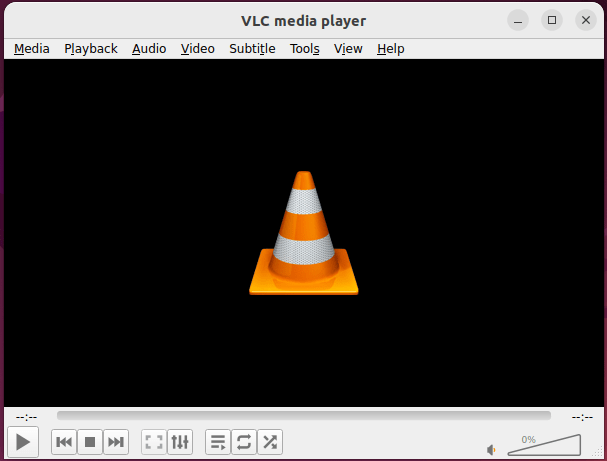How To Install VLC Media Player on Ubuntu 24.04 LTS

In this tutorial, we will show you how to install VLC Media Player on Ubuntu 24.04 LTS. VLC Media Player, often simply referred to as VLC, is a free and open-source multimedia player developed by the VideoLAN project. It’s renowned for its ability to play a wide array of audio and video formats without the need for additional codecs. VLC supports DVDs, audio CDs, VCDs, and various streaming protocols, making it a one-stop solution for all your media playback needs.
This article assumes you have at least basic knowledge of Linux, know how to use the shell, and most importantly, you host your site on your own VPS. The installation is quite simple and assumes you are running in the root account, if not you may need to add ‘sudo‘ to the commands to get root privileges. I will show you the step-by-step installation of the VLC Media Player on Ubuntu 24.04 (Noble Numbat). You can follow the same instructions for Ubuntu 22.04 and any other Debian-based distribution like Linux Mint, Elementary OS, Pop!_OS, and more as well.
Prerequisites
- A server running one of the following operating systems: Ubuntu and any other Debian-based distribution like Linux Mint.
- It’s recommended that you use a fresh OS install to prevent any potential issues.
- SSH access to the server (or just open Terminal if you’re on a desktop).
- 2 GHz dual-core processor or better.
- 4 GB RAM (system memory).
- 25 GB of free hard drive space.
- An active internet connection. You’ll need an internet connection to download the necessary packages and dependencies.
- An Ubuntu 24.04 system with root access or a user with sudo privileges.
Install VLC Media Player on Ubuntu 24.04
Step 1. Updating the Package Repository.
Before installing any new software, it’s always a good practice to update your system. Open a terminal and run the following commands:
sudo apt update sudo apt upgrade
This will ensure that your system has the latest package information and all installed packages are up to date.
Step 2. Installing VLC on Ubuntu.
- Method 1: Installing VLC Using Ubuntu Software Center (GUI)
The Ubuntu Software Center provides a user-friendly graphical interface for installing applications. Here’s how to use it to install VLC:
-
- Open the Ubuntu Software Center by clicking on the “Show Applications” button in the dock and searching for “Software.”
- Once the Software Center is open, use the search bar at the top to look for “VLC.”
- Click on the VLC Media Player icon in the search results.
- On the VLC page, click the “Install” button.
- You may be prompted to enter your password to authorize the installation.
- Wait for the installation to complete. The progress will be shown in the Software Center.
- Once installed, you can launch VLC from the Applications menu or by searching for it in the Activities overview.
This method is straightforward and recommended for users who prefer graphical interfaces over command-line operations.
- Method 2: Installing VLC Using Terminal (APT)
For users who are comfortable with the command line or prefer a faster installation method, using the terminal is an excellent option. The Advanced Package Tool (APT) is Ubuntu’s package management system, and it can be used to install VLC quickly. Follow these steps:
sudo apt install vlc
Once finished, you can launch VLC by typing vlc in the terminal or finding it in the Applications menu.
- Method 3: Installing VLC Using Snap
Snap is a universal package management system developed by Canonical, the company behind Ubuntu. Snaps are self-contained applications that include all necessary dependencies, making them easy to install and update. Here’s how to install VLC using Snap:
sudo snap install vlc
Once installed, you can launch VLC from the Applications menu or by typing vlc in the terminal.
The Snap version of VLC is sandboxed, which can provide additional security but may have limited access to system resources compared to the APT version.
- Method 4: Installing VLC Using Flatpak
Flatpak is another universal package management system that offers sandboxed applications. To use Flatpak to install VLC, follow these steps:
sudo apt install flatpak
Add the Flathub repository:
flatpak remote-add --if-not-exists flathub https://flathub.org/repo/flathub.flatpakrepo
Install VLC using Flatpak:
flatpak install flathub org.videolan.VLC
Launch VLC by searching for it in the Applications menu or by running:
flatpak run org.videolan.VLC

Flatpak offers another layer of isolation and can be useful for running applications across different Linux distributions.
- Method 5: Installing VLC Using PPA
Personal Package Archives (PPAs) can provide more up-to-date versions of software than the official Ubuntu repositories. To install VLC using a PPA:
sudo add-apt-repository ppa:videolan/stable-daily
Install VLC:
sudo apt update sudo apt install vlc
Be cautious when using PPAs, as they are not officially supported by Ubuntu and may introduce stability issues.
Each installation method has its pros and cons:
| Method | Pros | Cons |
|---|---|---|
| Software Center | User-friendly, official packages | May not have the latest version |
| APT | Fast, command-line efficiency | Requires terminal use |
| Snap | Easy updates, sandboxed | Larger package size, potential performance impact |
| Flatpak | Cross-distribution compatibility | Additional setup required |
| PPA | Up-to-date versions | Potential stability issues |
Choose the method that best suits your needs and technical comfort level.
Congratulations! You have successfully installed VLC. Thanks for using this tutorial for installing the VLC Media Player on the Ubuntu 24.04 LTS system. For additional help or useful information, we recommend you check the official VLC website.